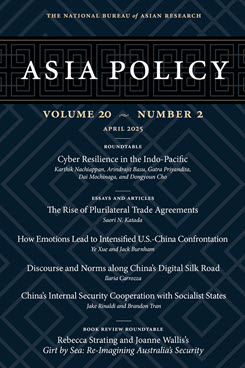Article in Asia Policy 20.2
Discourse and Norms along China’s Digital Silk Road
This article examines China’s Digital Silk Road (DSR) as a tool for extending Beijing’s discursive power globally, especially among developing nations, by analyzing Chinese-language texts to understand how the DSR is framed and what the implications of this framing are for global technology governance.
EXECUTIVE SUMMARY
MAIN ARGUMENT
The DSR, a component of the Belt and Road Initiative, is portrayed in official discourse not just as a means of technological connectivity but as a vehicle for promoting China’s vision of cyber sovereignty and digital governance in contrast with Western models. An examination of a wide range of Chinese texts reveals that while the DSR may facilitate digital authoritarianism, it also serves China’s broader geopolitical ambitions by fostering dependence on Chinese technology among countries in the global South. This finding underscores the importance of understanding the DSR’s normative content to grasp China’s influence on global technology standards and the international order.
POLICY IMPLICATINOS
- Policymakers in liberal democracies and DSR host countries should collaborate on creating international digital governance norms through platforms such as the United Nations or the G-20, focusing on data privacy, cybersecurity, and an open internet to promote transparency and user rights globally.
- Liberal democracies should fund alternatives to Chinese digital infrastructure projects, such as through the Blue Dot Network, ensuring these initiatives align with international norms.
- To strengthen local capacity in DSR recipient countries, liberal democracies should offer targeted training, scholarships, and partnerships to build expertise in telecommunications and digital governance that meets international standards.
- DSR host countries should implement transparency measures, such as open procurement and independent audits for DSR projects, and consider the potential creation of an international watchdog to monitor and mitigate risks associated with these initiatives.
Ilaria Carrozza is a Senior Researcher at the Peace Research Institute Oslo (PRIO) in Norway. Her research focuses on understanding how China extends its influence abroad and challenges the existing world order, including subjects such as China’s foreign policy; the normative, political, and security impact of artificial intelligence; great-power competition; the geopolitics of technology; and the Digital Silk Road.
About Asia Policy
Asia Policy is a peer-reviewed scholarly journal presenting policy-relevant academic research on the Asia-Pacific that draws clear and concise conclusions useful to today’s policymakers. Asia Policy is published quarterly in January, April, July, and October and accepts submissions on a rolling basis. Learn more


